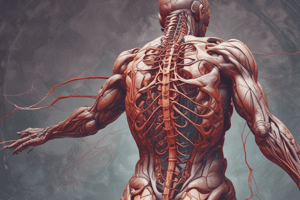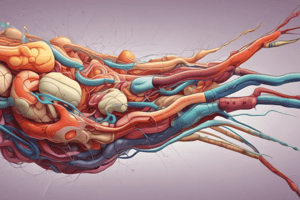Podcast
Questions and Answers
What role does the anterior cingulate cortex (ACC) play in the experience of pain?
What role does the anterior cingulate cortex (ACC) play in the experience of pain?
- It is responsible for motor control.
- It is primarily involved in visual processing.
- It is associated with attention and emotional responses. (correct)
- It regulates the body's stress response.
Which brain area contributes to motor control and coordination in response to pain?
Which brain area contributes to motor control and coordination in response to pain?
- Frontal cortex
- Anterior cingulate cortex (ACC)
- Supplementary motor area (SMA) (correct)
- Limbic system
What does an fMRI scan reveal about changes in brain activity associated with pain?
What does an fMRI scan reveal about changes in brain activity associated with pain?
- Areas may show increased activity (red) or decreased activity (yellow) depending on the context. (correct)
- Yellow indicates increased activity while red indicates decreased activity.
- It consistently shows increased activity in all brain areas.
- It only functions as a clinical tool for patients experiencing chronic pain.
What might occur if an individual is threatened with pain, even if no actual pain is inflicted?
What might occur if an individual is threatened with pain, even if no actual pain is inflicted?
Which brain areas are involved in processing sensory and emotional components of pain?
Which brain areas are involved in processing sensory and emotional components of pain?
Which type of pain is characterized by a specific localization within the body?
Which type of pain is characterized by a specific localization within the body?
What describes pain often experienced as numbness or a prickling sensation?
What describes pain often experienced as numbness or a prickling sensation?
What type of pain is not well localized and can refer to other parts of the body?
What type of pain is not well localized and can refer to other parts of the body?
Which of the following examples best illustrates neuropathic pain?
Which of the following examples best illustrates neuropathic pain?
Which type of pain is related to damage or lesions in the nervous system?
Which type of pain is related to damage or lesions in the nervous system?
What describes the shooting pain often associated with nerve damage, such as in sciatica?
What describes the shooting pain often associated with nerve damage, such as in sciatica?
Which classification includes pain types such as nociceptive, neuropathic, and sympathetic pain?
Which classification includes pain types such as nociceptive, neuropathic, and sympathetic pain?
What is the primary source of nociceptive pain?
What is the primary source of nociceptive pain?
Which area of the brain serves as the primary relay center for sensory information?
Which area of the brain serves as the primary relay center for sensory information?
What does the sensory homunculus represent?
What does the sensory homunculus represent?
Which body parts are represented with greater surface area in the sensory homunculus?
Which body parts are represented with greater surface area in the sensory homunculus?
Which structure is primarily associated with emotional responses to pain?
Which structure is primarily associated with emotional responses to pain?
What is the role of the insula in the context of pain?
What is the role of the insula in the context of pain?
Which of the following components is NOT involved in the emotional experience of pain?
Which of the following components is NOT involved in the emotional experience of pain?
Which neural structures are associated with movement and affected by pain?
Which neural structures are associated with movement and affected by pain?
What does greater representation in the sensory homunculus suggest about a body part?
What does greater representation in the sensory homunculus suggest about a body part?
What effect can neuroplasticity have on pain signals?
What effect can neuroplasticity have on pain signals?
Which spinal segments are associated with pain in the thumb and first finger?
Which spinal segments are associated with pain in the thumb and first finger?
What is the role of descending pathways in sensation?
What is the role of descending pathways in sensation?
What is indicated by the concept of spinal dermatomes?
What is indicated by the concept of spinal dermatomes?
How do pain signals typically reach the brain from the spinal cord?
How do pain signals typically reach the brain from the spinal cord?
What happens to pain signals during acute pain?
What happens to pain signals during acute pain?
What is a potential outcome of damage or interference in the spinal segments?
What is a potential outcome of damage or interference in the spinal segments?
Which statement correctly describes the pathway of pain signals?
Which statement correctly describes the pathway of pain signals?
What are the main types of pain assessed in the nociceptive system?
What are the main types of pain assessed in the nociceptive system?
Which part of the nervous system is NOT included when discussing the pathophysiology of pain?
Which part of the nervous system is NOT included when discussing the pathophysiology of pain?
Which type of sensation is directly associated with chemical actions on the skin?
Which type of sensation is directly associated with chemical actions on the skin?
What substances are released from subcutaneous tissue during trauma?
What substances are released from subcutaneous tissue during trauma?
How does the body perceive the intensity of touch, such as whether it is a light touch or a heavy touch?
How does the body perceive the intensity of touch, such as whether it is a light touch or a heavy touch?
Which of the following best describes the pathway of sensory information concerning pain?
Which of the following best describes the pathway of sensory information concerning pain?
What phenomenon allows for perceiving location in response to physical stimuli?
What phenomenon allows for perceiving location in response to physical stimuli?
What sensation would be experienced when the skin is irritated by capsaicin?
What sensation would be experienced when the skin is irritated by capsaicin?
Flashcards are hidden until you start studying
Study Notes
Acknowledgment of Traditional Owners
- Tribute paid to traditional landowners and Indigenous elders, recognizing their ongoing role in the community.
Pathophysiological Classification of Pain
- Nociceptive pain is categorized into three types:
- Superficial somatic (from skin/mucosa)
- Deep somatic (from bones/joints/musculoskeletal system)
- Visceral (from internal organs)
- Nociceptive pain allows for specific localization, while visceral pain is poorly localized and may refer to other body parts.
Neuropathic Pain
- Neuropathic pain results from lesions on peripheral nerves, example: diabetic peripheral neuropathy, causing pain in extremities.
- Symptoms include numbness and prickling sensations, compared to walking on broken glass.
- No-slip plastic nerve pain may indicate damage within the spinal cord, producing shooting pain in dermatomal distribution (e.g., sciatica).
Pain Classification Changes
- Pain has been reclassified into nociceptive versus non-nociceptive pain types.
- Nociceptive includes somatic and visceral pain, while non-nociceptive includes neuropathic pain and sympathetic pain.
- Differentiation of nociceptive pain exists, but newer classifications have better integrated understanding of neuropathic and plastic pain.
Pathophysiology of Pain
- Involves multiple areas: periphery (skin, nerve paths), spinal cord, and brain.
- Peripheral senses include touch, pressure, temperature, and chemical sensations that trigger pain responses via nerve endings.
- Chemicals like histamine and substance P released from injured tissues can affect peripheral nerves directly.
Brain Processing of Pain
- Pain signals ascend to the brain through specific pathways, often spreading to various structures.
- Acute pain activates the neo trigeminal thalamic tract and the medial lemniscus, with crossover effect to opposite brain side.
- Various brain regions are involved in processing pain, including the medulla, reticular formation, and periaqueductal grey matter.
Sensory Homunculus
- The sensory homunculus in the brain represents different body areas based on nerve density; hands and lips have larger representation due to high sensory input.
- Mapping of sensations to specific brain areas illustrates how pain is experienced differently across body parts.
Emotional and Cognitive Responses to Pain
- Pain signals are relayed through the thalamus to emotional centers like the amygdala and insula, influencing emotional response.
- The anterior cingulate cortex (ACC) plays a role in attention, leading to difficulties in concentration when in pain.
- Pain processing also affects motor control through the supplementary motor area and somatosensory cortex.
Functional MRI in Pain Research
- Functional MRI is a research tool, not clinically used for pain assessment in patients.
- Differences in brain activity are visualized: increased activity appears red, while decreased activity appears yellow.
- Research provides insight into the brain's response to pain, demonstrating that the perception of threat can trigger pain responses without physical harm.
Neuroplasticity and Pain Modulation
- Neuroplasticity may result in either amplification or dampening of pain signals in the spine.
- Downward regulation from the brain can alter the intensity of pain experienced.
Studying That Suits You
Use AI to generate personalized quizzes and flashcards to suit your learning preferences.




